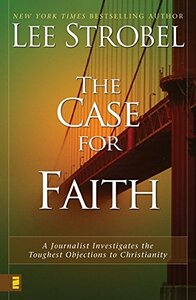Take a photo of a barcode or cover
62 reviews for:
The Case for Faith: A Journalist Investigates the Toughest Objections to Christianity
Lee Strobel
62 reviews for:
The Case for Faith: A Journalist Investigates the Toughest Objections to Christianity
Lee Strobel
I read this book with two friends over four book clubs. We only took on two objections at a time to facilitate deeper discussion. I can't say that the book really points out any new revelations, but was interesting to discuss with others and reflect on our faith, and feelings behind what our feelings or beliefs are.
Lee Strobel runs over much of the same ground that many apologists cover: the existence of pain and evil; scientific refutations of Christianity; the cruelty of hell; the abuses of various churches; and so on. And while much of this book does a reasonably convincing job of addressing these common objections to Christian faith, to my mind, Strobel stumbles on a couple points.
The first of these is his general tone. As a journalist, it is clear that Strobel has grown accustomed to tailoring his language to a less than scholarly audience. To my mind, "The Case for Faith" reads like it was written for the "young adult" market, not for the more mature reader. While this is arguably a minor quibble, it does set a tone which comes off as occasionally coddling. Naturally, this works against the author's intent.
But Strobel's tone is not as major a flaw as his repeated recourse to "intelligent design." In terms of apologetics, intelligent design is, to put it bluntly, a dog. This has nothing to do with its truth or falsehood: intelligent design may, very well, be essentially correct. However, it is an attempt to argue against evolution on scientific grounds and, as such, is subject to a degree of scientific scrutiny which it cannot survive (at least, not at the present time). The mistake proponents of intelligent design, including Strobel, make is to accept the theory of evolution as necessarily representing a direct challenge to faith in God. I contend that this is not so and that, therefore, the entire debate between the two schools of though is little more than a distracting red herring. However, by returning to intelligent design time and time again, Strobel threatens to undermine the best points his book does score which, as with all apologetics, are to be found in metaphysical propositions and archaeological evidence.
Several people have recommended Strobel's other books to me, but given my opinion of the evolution vs. intelligent design debate, I fear it would be a waste of my time and money. Intelligent design is not a sufficiently robust theory to contend with evolution on its own ground; it smacks of being the "flavor of the month." So, until the proponents of intelligent design are able to answer the criticisms which it, not surprisingly, attracts from the academic community, I'll stick closer to apologists who do not utilize it as a central, weight-bearing pillar of their arguments.
The first of these is his general tone. As a journalist, it is clear that Strobel has grown accustomed to tailoring his language to a less than scholarly audience. To my mind, "The Case for Faith" reads like it was written for the "young adult" market, not for the more mature reader. While this is arguably a minor quibble, it does set a tone which comes off as occasionally coddling. Naturally, this works against the author's intent.
But Strobel's tone is not as major a flaw as his repeated recourse to "intelligent design." In terms of apologetics, intelligent design is, to put it bluntly, a dog. This has nothing to do with its truth or falsehood: intelligent design may, very well, be essentially correct. However, it is an attempt to argue against evolution on scientific grounds and, as such, is subject to a degree of scientific scrutiny which it cannot survive (at least, not at the present time). The mistake proponents of intelligent design, including Strobel, make is to accept the theory of evolution as necessarily representing a direct challenge to faith in God. I contend that this is not so and that, therefore, the entire debate between the two schools of though is little more than a distracting red herring. However, by returning to intelligent design time and time again, Strobel threatens to undermine the best points his book does score which, as with all apologetics, are to be found in metaphysical propositions and archaeological evidence.
Several people have recommended Strobel's other books to me, but given my opinion of the evolution vs. intelligent design debate, I fear it would be a waste of my time and money. Intelligent design is not a sufficiently robust theory to contend with evolution on its own ground; it smacks of being the "flavor of the month." So, until the proponents of intelligent design are able to answer the criticisms which it, not surprisingly, attracts from the academic community, I'll stick closer to apologists who do not utilize it as a central, weight-bearing pillar of their arguments.
This is a great book. This is the 3rd Lee Strobel book I've read (Case for a Creator and Case for Christ), and I've loved EVERY SINGLE ONE! I love how it proves that you don't have to dumb down yourself to have faith. Great book!
informative
reflective
slow-paced
challenging
informative
reflective
medium-paced
Glad to hear from an author who admits that he doesn't know it all and that there may be things that still need researching but overall, it's a really good book in which he interrogates various knowledgeable people in regard to questionable things about Christ and Christianity. It was enjoyable to hear what psychologists, doctors and many others would have to say about it.
I enjoyed this book more than I was expecting. The book addresses 8 objections people have to Christianity by presenting interviews with highly decorated Christian scholars I guess you could call them.
I really liked a couple of the guys that were interviewed, particularly the first and the last interviews. They didn't seem to talk like they had all the answers. They just said things that would be encouraging to someone who has doubts. Those helped me most.
My main issue with the thesis at the end is that the author claims that if you want to see evidence for God, it's plentiful if you want to believe. That feels a bit circular to me. He gives the two categories of people: those who want to believe but have doubt and those who do not want to believe regardless of any evidence presented to them. Is there no middle ground here? Idk but the book obviously has a Christian bias. No counterarguments are given through interviews with highly decorated non-Christian scholars. Sometimes an atheist/skeptic is quoted but if feels like they aren't given much context. Hume is quoted at one point, who is an author I happen to have just read, and it seemed like his arguments were misrepresented.
I definitely enjoyed some of the discussions and would recommend this to a new Christian, but I don't think I'd recommend it to an atheist except maybe as a way to generate discussion, not like a way to prove that the atheist is wrong.
I really liked a couple of the guys that were interviewed, particularly the first and the last interviews. They didn't seem to talk like they had all the answers. They just said things that would be encouraging to someone who has doubts. Those helped me most.
My main issue with the thesis at the end is that the author claims that if you want to see evidence for God, it's plentiful if you want to believe. That feels a bit circular to me. He gives the two categories of people: those who want to believe but have doubt and those who do not want to believe regardless of any evidence presented to them. Is there no middle ground here? Idk but the book obviously has a Christian bias. No counterarguments are given through interviews with highly decorated non-Christian scholars. Sometimes an atheist/skeptic is quoted but if feels like they aren't given much context. Hume is quoted at one point, who is an author I happen to have just read, and it seemed like his arguments were misrepresented.
I definitely enjoyed some of the discussions and would recommend this to a new Christian, but I don't think I'd recommend it to an atheist except maybe as a way to generate discussion, not like a way to prove that the atheist is wrong.
hopeful
informative
inspiring
reflective
medium-paced
challenging
hopeful
informative
inspiring
reflective
tense
slow-paced


